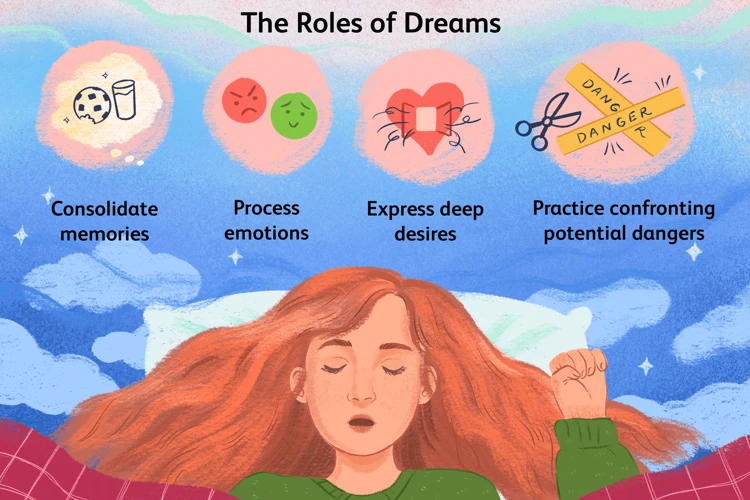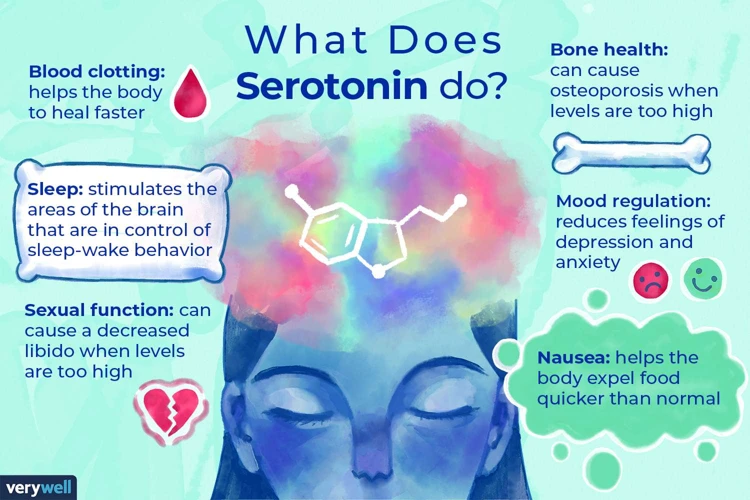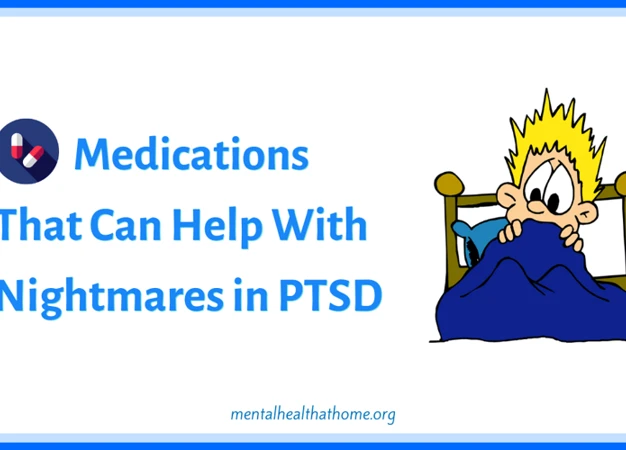Nightmares, those hauntingly vivid dreams that leave us startled and drenched in sweat, can disrupt our sleep and have a profound impact on our overall well-being. While they are a natural part of the dream cycle, recurrent nightmares can take a toll on our mental and emotional health. Fortunately, there are various treatment approaches available to manage nightmares, and one such option is the use of medications. In this article, we will explore the role of medications in managing nightmares, the commonly prescribed medications, their effectiveness, potential side effects, and the importance of working with healthcare professionals to find the most suitable treatment plan. So, let’s delve into the science behind nightmares and discover how medications can potentially provide relief and restore peaceful sleep.
The Science behind Nightmares

Nightmares are a fascinating aspect of our dream world, where our deepest fears and anxieties come to life in startling clarity. involves a complex interplay of psychological and neurological factors. During REM (Rapid Eye Movement) sleep, the stage of sleep where most dreams occur, our brains process and consolidate emotional experiences from the day. Nightmares can be triggered by various factors such as trauma, stress, or even certain medications. Understanding Nightmares requires exploring the intricate connections between the amygdala, the hippocampus, and the prefrontal cortex, which are responsible for fear processing and memory formation. By better understanding the science behind nightmares, we can unravel the mysteries of our subconscious mind and potentially find effective interventions to overcome these terrifying dream experiences. Exploring nightmares and trauma can shed further light on the psychological underpinnings of these dreams, while lucid dreaming may offer a potential solution for nightmares.
Understanding Nightmares
Nightmares, as the word implies, are deeply unsettling dreams that can fill us with fear and anxiety. involves delving into the complex interplay of psychological and neurological factors that contribute to their occurrence. These distressing dreams often stem from our subconscious, where unresolved emotions and experiences manifest in symbolic and often terrifying ways. The amygdala, a key structure in the brain responsible for processing emotions, plays a pivotal role in the generation of nightmares. It becomes highly active during REM sleep, the stage of sleep when dreams predominantly occur. Additionally, the hippocampus, which is involved in memory formation, and the prefrontal cortex, responsible for decision-making and problem-solving, also play crucial roles in shaping our dream experiences.
Nightmares can occur for a variety of reasons. Traumatic experiences, such as accidents or abuse, can trigger nightmares as the brain attempts to process and make sense of the distressing event. Stress, anxiety, and mental health disorders like post-traumatic stress disorder (PTSD) or anxiety disorders can also contribute to recurrent nightmares. Certain medications, like antidepressants or beta-blockers, can interfere with the normal sleep cycle and lead to nightmare formation as a side effect.
To gain a deeper understanding of the science behind nightmares and the role of fear in dreams, researchers have conducted extensive studies. These studies have revealed that nightmares serve a purpose in our emotional and psychological well-being. They provide an opportunity for us to confront and process our fears, helping to desensitize us to traumatic experiences and fears in a safe environment. Nightmares can act as warning signals, alerting us to unresolved issues or psychological distress that needs attention.
By unraveling the intricacies of nightmares, researchers and clinicians can better assist individuals struggling with these distressing dreams. Through therapies such as cognitive-behavioral therapy for nightmares (CBT-N), individuals can learn to cope with and overcome the recurring nightmares. This therapy aims to identify and address the underlying causes of nightmares while equipping individuals with strategies to manage the accompanying fear and anxiety. The journey of understanding nightmares is an ongoing and evolving field of study, offering hope for those afflicted with these unsettling dreams.
Effects of Nightmares

Nightmares can have profound effects on both our sleep quality and our psychological well-being. First and foremost, nightmares heavily impact sleep quality. When nightmares occur, they can disrupt our sleep patterns, causing frequent awakenings, restlessness, and a general sense of unease throughout the night. The constant interruption of sleep can lead to feelings of fatigue and exhaustion during the day, making it difficult to focus and function optimally. Secondly, nightmares can have significant psychological effects on individuals. These vivid and distressing dreams can induce feelings of fear, anxiety, and helplessness, eliciting a strong emotional response even after waking up. Individuals who experience recurrent nightmares may develop anxiety around sleep itself, leading to insomnia and further sleep disturbances. It is crucial to recognize and address the effects of nightmares to ensure a good night’s sleep and promote overall mental well-being.
Impact on Sleep Quality
Nightmares have a significant impact on sleep quality, often leading to disrupted and fragmented sleep patterns. When individuals experience nightmares, they may wake up suddenly, feeling fearful, anxious, or even in a state of panic. This interruption in sleep can make it challenging to fall back asleep, resulting in sleep deprivation and daytime drowsiness. The vivid and disturbing nature of nightmares can also lead to difficulty in achieving a restful sleep state, as the mind remains agitated even after waking up. This can further perpetuate a cycle of poor sleep quality, leading to increased fatigue and decreased daytime functioning. Studies have shown that individuals who experience frequent nightmares are more likely to report symptoms of insomnia, such as difficulty falling asleep, staying asleep, or waking up too early in the morning. It is crucial to address the impact of nightmares on sleep quality, as adequate sleep is vital for overall health and well-being. By understanding the connection between nightmares and sleep disruption, individuals can seek appropriate treatment options to improve their sleep quality and break the cycle of recurrent nightmares and sleep disturbances.
Psychological Effects
Nightmares can have a profound impact on our psychological well-being. When we experience intense and distressing dreams, they can leave us feeling anxious, fearful, and unsettled. The psychological effects of nightmares can extend beyond the moment of waking up, lingering throughout the day and impacting our overall mood and mindset. The vividness and emotional intensity of nightmares can lead to symptoms such as heightened anxiety, irritability, and even symptoms of post-traumatic stress disorder (PTSD) in some cases. Recurrent nightmares can also disrupt our sense of safety and control, instilling a constant fear of falling back asleep and facing another distressing dream. Over time, these psychological effects can contribute to sleep disturbances, increased stress levels, and a decreased quality of life. Seeking effective treatment for nightmares is crucial not only for a peaceful night’s sleep but also for the overall mental and emotional well-being of individuals experiencing these distressing dreams. By addressing the psychological impact of nightmares, individuals can regain a sense of comfort, security, and emotional balance in their daily lives.
Treatment Approaches

When it comes to managing nightmares, there are various treatment approaches available, ranging from non-medical interventions to the role of medications. Non-Medical Interventions focus on psychological techniques such as counseling, therapy, and cognitive-behavioral interventions. These approaches aim to identify and address the underlying causes of nightmares, such as trauma or anxiety, through talk therapy and other therapeutic techniques. In addition to non-medical interventions, the role of medications can play a significant role in managing nightmares. Medications such as selective serotonin reuptake inhibitors (SSRIs), prazosin, and benzodiazepines are commonly prescribed to help reduce the frequency and severity of nightmares. By combining both non-medical interventions and medications, individuals can find a comprehensive approach that best suits their needs and provides relief from the distressing effects of nightmares.
Non-Medical Interventions
Non-medical interventions play a crucial role in managing nightmares and can be effective in alleviating the frequency and intensity of disturbing dreams. These interventions focus on addressing the underlying causes of nightmares and promoting overall psychological well-being. One non-medical intervention that has shown promise is cognitive behavioral therapy for nightmares (CBT-N). This therapy involves identifying and challenging negative thought patterns related to the nightmares, developing coping strategies, and gradually desensitizing oneself to the fear-inducing elements of the dreams. Another approach is relaxation techniques, such as deep breathing exercises, progressive muscle relaxation, and guided imagery. These techniques aim to reduce anxiety and promote relaxation before bedtime, creating a calm and peaceful sleep environment. Other non-medical interventions may include keeping a dream journal to track patterns and triggers, implementing good sleep hygiene practices, and creating a soothing bedtime routine. It is important to note that non-medical interventions may not provide immediate relief, but with consistency and patience, they can contribute to long-term improvement in managing nightmares.
The Role of Medications
The role of medications in managing nightmares is an important aspect of treatment. Medications can help alleviate the intensity and frequency of nightmares, allowing individuals to experience more restful and peaceful sleep. There are several classes of medications commonly used for this purpose.
1. Selective Serotonin Reuptake Inhibitors (SSRIs): SSRIs are a type of antidepressant medication that work by increasing the levels of serotonin in the brain. While primarily used to treat depression and anxiety, SSRIs can also be effective in reducing nightmares. Examples include medications like fluoxetine (Prozac), sertraline (Zoloft), and paroxetine (Paxil).
2. Prazosin: Prazosin is an alpha-blocker medication originally developed to treat high blood pressure. However, it has also shown promise in the management of nightmares associated with post-traumatic stress disorder (PTSD). By blocking the effects of adrenaline, prazosin can help reduce the intensity and frequency of nightmares.
3. Benzodiazepines: Benzodiazepines are a class of sedatives that can be used to suppress nightmares and promote relaxation. However, they are typically prescribed only for short-term use due to their potential for dependence and tolerance. Examples include medications like diazepam (Valium), lorazepam (Ativan), and clonazepam (Klonopin).
It is important to note that medications should be prescribed and monitored by a healthcare professional with expertise in sleep medicine or psychiatry. The choice of medication will depend on individual factors such as the underlying cause of nightmares, medical history, and potential interactions with other medications. The use of medication should be part of a comprehensive treatment plan that may also include non-medical interventions like therapy and lifestyle modifications.
Medications can play a valuable role in managing nightmares and improving sleep quality. However, the decision to use medications should be made in consultation with a healthcare professional, considering the potential benefits, risks, and individual needs of the person seeking treatment.
Commonly Prescribed Medications

When it comes to managing nightmares, healthcare professionals may prescribe various medications based on individual needs and symptoms. Here are some commonly prescribed medications that have shown promise in alleviating nightmare symptoms:
1. Selective Serotonin Reuptake Inhibitors (SSRIs): These medications, such as sertraline and fluoxetine, are typically used to treat depression and anxiety. They work by increasing serotonin levels in the brain, which can help regulate sleep patterns and reduce the occurrence of nightmares.
2. Prazosin: Originally developed to treat high blood pressure, prazosin has also been found to be effective in reducing nightmares associated with post-traumatic stress disorder (PTSD). It works by blocking certain receptors in the brain, thereby decreasing the intensity and frequency of nightmares.
3. Benzodiazepines: These sedative medications, such as clonazepam and diazepam, can be prescribed for short-term use to manage severe nightmares. They have a calming effect on the central nervous system, promoting relaxation and reducing the likelihood of disturbing dreams.
It is important to note that medication choices and dosages should be determined by a healthcare professional based on an individual’s specific needs and medical history.
1. Selective Serotonin Reuptake Inhibitors (SSRIs)
Selective Serotonin Reuptake Inhibitors (SSRIs) are a class of medications commonly prescribed to manage nightmares. These medications primarily work by increasing the levels of serotonin, a neurotransmitter known to regulate mood and emotions, in the brain. By doing so, SSRIs can help stabilize emotions and potentially reduce the intensity and frequency of nightmares. Some commonly prescribed SSRIs include Prozac, Zoloft, and Lexapro. It is important to note that SSRIs are primarily indicated for the treatment of depression and anxiety disorders, but studies have shown their effectiveness in alleviating nightmares as well.
When considering the use of SSRIs for nightmares, it is crucial to consult with a qualified healthcare professional who can evaluate your specific symptoms and medical history. The dosage and duration of treatment will vary based on individual needs. It is also essential to be aware of potential side effects, such as nausea, dizziness, and changes in sexual function, which may occur with SSRI use. Regular follow-up appointments with your healthcare provider are necessary to monitor the effectiveness of the medication and address any concerns or side effects that may arise.
It’s important to highlight that SSRIs should not be used without medical supervision and should not be abruptly stopped. Discontinuation of these medications should be done under the guidance of a healthcare professional to minimize potential withdrawal effects. SSRIs can be a valuable tool in managing nightmares, particularly for individuals who may also be experiencing co-existing conditions such as depression or anxiety. However, each person’s response to medication may vary, and a comprehensive treatment plan should include a combination of medical interventions, therapy, and lifestyle modifications.
2. Prazosin
Prazosin is a medication that is commonly prescribed for the management of nightmares, particularly in individuals with post-traumatic stress disorder (PTSD). It belongs to a class of medications called alpha-1 blockers, which work by blocking receptors in the brain that are responsible for the body’s stress response. By blocking these receptors, Prazosin helps to reduce the intensity and frequency of nightmares. It has been found to be particularly effective in reducing the distressing imagery and emotional intensity associated with nightmares related to trauma.
When taking Prazosin, it is important to start with a low dose and gradually increase it under the guidance of a healthcare professional. The dosage is typically adjusted based on an individual’s response and tolerance. Monitoring blood pressure is crucial during the initial phase of taking Prazosin, as it can cause a drop in blood pressure, especially when transitioning from lying down to standing up.
Research has shown promising results regarding the effectiveness of Prazosin in managing nightmares. A study published in the Journal of Clinical Psychopharmacology found that Prazosin significantly reduced nightmares and improved sleep quality in veterans with PTSD. However, it is important to note that individual response to Prazosin may vary, and it may not be effective for everyone.
Like any medication, Prazosin can have potential side effects. The most common side effects include dizziness, lightheadedness, and drowsiness. These side effects are more prevalent when starting the medication or when the dosage is increased. It is advisable to take Prazosin at bedtime to minimize these effects. It is essential to discuss any concerns or side effects with a healthcare professional, as they can help adjust the dosage or consider alternative treatment options if needed.
Prazosin, an alpha-1 blocker medication, has shown promise in managing nightmares, especially in individuals with PTSD. It works by blocking receptors in the brain that are involved in the stress response. While it can be effective in reducing the intensity and frequency of nightmares, individual response may vary. It is important to work closely with a healthcare professional when considering Prazosin as a treatment option and to monitor blood pressure and potential side effects.
3. Benzodiazepines
Benzodiazepines are a class of medications commonly prescribed for managing nightmares. These medications work by enhancing the activity of a neurotransmitter called gamma-aminobutyric acid (GABA) in the brain, which helps to reduce anxiety and promote relaxation. Benzodiazepines have sedative properties, making them effective in addressing sleep disturbances associated with nightmares. They can help to decrease the intensity and frequency of nightmares, allowing individuals to experience more restful sleep. However, it is essential to note that benzodiazepines should be used cautiously and under the guidance of a healthcare professional, as they can be habit-forming and may lead to dependence if used for an extended period. Some common benzodiazepines prescribed for nightmares include clonazepam, lorazepam, and diazepam. It is crucial to discuss the potential benefits and risks with a healthcare provider before starting any medication regimen involving benzodiazepines. They will be able to provide personalized guidance and monitor the individual’s response to the medication to ensure its efficacy and safety.
Consultation and Prescription

When it comes to managing nightmares with medication, it is crucial to seek consultation and prescription from a healthcare professional. While over-the-counter sleep aids may seem like a convenient option, they may not be effective in addressing the specific causes and underlying issues related to nightmares. Consulting with a healthcare professional, such as a primary care physician or a psychiatrist, allows for a comprehensive evaluation of the individual’s symptoms, medical history, and any potential underlying conditions, ensuring that the prescribed medication is appropriate and safe for use. Healthcare professionals can provide personalized guidance on dosage, timing, and potential interactions with other medications. They can also monitor the individual’s response to the medication and adjust the treatment plan if needed. It is important to follow the prescribed guidelines and keep the healthcare professional informed of any changes in symptoms or concerns throughout the treatment process. By working closely with a healthcare professional, individuals can optimize the effectiveness of the medication and ensure their overall well-being.
Effectiveness of Medications

When it comes to managing nightmares, medications play a crucial role in alleviating the distress and improving sleep quality. However, the effectiveness of medications can vary from person to person. Evidence-based research suggests that certain medications, such as Selective Serotonin Reuptake Inhibitors (SSRIs), Prazosin, and Benzodiazepines, have shown promising results in reducing nightmare frequency and intensity. It is important to note that individual variation in response is common, and what works for one person may not work for another. Some individuals may experience significant improvement with medication, while others may require a combination of medication and therapy to achieve desired outcomes. Collaborating with healthcare professionals, such as psychiatrists and therapists, is essential to tailor the medication regimen to individual needs and monitor the progress closely. By working closely with professionals and being open about symptoms and concerns, individuals can maximize the benefits of medications and regain control over their sleep and well-being.
Evidence-Based Research
Evidence-based research plays a crucial role in determining the effectiveness of medications in managing nightmares. Numerous studies have been conducted to examine the impact of different medications on nightmares and sleep quality. Evidence-based research provides valuable insights into the specific medications that have shown promising results, helping healthcare professionals make informed decisions when prescribing treatments. For example, studies have shown that selective serotonin reuptake inhibitors (SSRIs) can reduce nightmare frequency and intensity in individuals with post-traumatic stress disorder (PTSD). Additionally, research on the medication prazosin has demonstrated its efficacy in reducing nightmares associated with PTSD. These findings give clinicians and patients confidence in the potential benefits of certain medications for managing nightmares. It is important to note that evidence-based research continually evolves, with new studies being conducted and analyzed to further investigate the effectiveness and safety of medications. Staying updated on the latest research findings is crucial to ensure the most effective and reliable treatment approach for managing nightmares.
Individual Variation in Response
When it comes to the effectiveness of medications in managing nightmares, it is important to recognize individual variation in response. Not everyone will have the same experience or benefit from the same medication. Each person’s physiology and underlying condition can play a role in how they respond to treatment. While some individuals may find relief and experience a significant reduction in nightmares with a particular medication, others may not respond as favorably.
It’s essential for healthcare professionals to carefully monitor the individual’s response to medication, adjusting the dosage if necessary or exploring alternative options. Tracking the frequency and intensity of nightmares, as well as any side effects experienced, can help inform treatment decisions. Close communication between the patient and healthcare provider is crucial in assessing the effectiveness of the chosen medication and making any necessary adjustments.
Additionally, individual variation in response highlights the importance of tailoring treatment plans to meet the specific needs of each person. What works for one individual may not work for another, and finding the right medication and dosage may involve some trial and error. Patience is key as healthcare professionals and patients work together to find the most effective approach.
Acknowledging and understanding individual variation in response is crucial in the management of nightmares. It emphasizes the need for personalized treatment plans and highlights the importance of ongoing communication and collaboration between healthcare professionals and patients. By recognizing the unique responses of individuals, healthcare providers can optimize treatment outcomes and help individuals find relief from the distressing impact of nightmares.
Potential Side Effects

When considering the use of medications for managing nightmares, it is important to be aware of the potential side effects that may arise from their use. While these medications can be effective in alleviating nightmares, they may also present certain drawbacks. One common side effect is drowsiness, which can affect daily functioning and productivity. Additionally, some individuals may experience nausea and digestive issues as a result of taking these medications. Another possible side effect is mood changes, which can range from mild mood swings to more significant shifts in emotions. It is crucial to discuss these potential side effects with healthcare professionals to assess the risks and benefits and make an informed decision about the most suitable treatment approach for managing nightmares.
1. Drowsiness
Drowsiness is a potential side effect associated with certain medications used to manage nightmares. When taking medications such as selective serotonin reuptake inhibitors (SSRIs) or benzodiazepines, it is not uncommon to experience feelings of drowsiness, fatigue, or sluggishness during the day. This drowsiness can impact daily activities and may interfere with work, school, or other responsibilities. It is important to be aware of this potential side effect and adjust daily routines accordingly. Drowsiness can be managed by ensuring adequate sleep at night and avoiding tasks that require alertness or concentration until the drowsiness subsides. It is also essential to follow the recommended dosage and timing of medication administration to minimize the occurrence of this side effect. It is advisable to consult with a healthcare professional if drowsiness persists or becomes severe, as they can provide guidance and recommend dosage adjustments if necessary.
2. Nausea and Digestive Issues
Nausea and digestive issues are potential side effects that can be associated with certain medications used to manage nightmares. While these side effects are not experienced by everyone, it is important to be aware of the potential impact they may have on individuals. Some medications, such as Selective Serotonin Reuptake Inhibitors (SSRIs), have been known to cause gastrointestinal disturbances including nausea, vomiting, and upset stomach. These side effects are usually temporary and tend to improve over time as the body adjusts to the medication. In some cases, healthcare professionals may prescribe anti-nausea medications along with the primary nightmare management medication to alleviate these symptoms. It is crucial for individuals to communicate any digestive issues they are experiencing with their healthcare provider, as they can provide guidance on managing these side effects. Additionally, maintaining a healthy diet, staying hydrated, and avoiding triggers such as certain foods or activities that exacerbate gastrointestinal discomfort can also be beneficial in managing these issues. Remember, everyone’s response to medication can vary, so it is essential to have regular communication with healthcare professionals to address any concerns and adjust the treatment plan accordingly.
3. Mood Changes
Mood changes can be a potential side effect of certain medications used to manage nightmares. Some individuals may experience a shift in their emotional state, such as feeling more irritable, anxious, or depressed. These changes in mood can be attributed to the pharmacological effects of the medications on the brain and neurotransmitter systems. For example, selective serotonin reuptake inhibitors (SSRIs), which are commonly prescribed for nightmares, work by increasing serotonin levels in the brain. While this can alleviate nightmares, it may also affect other aspects of mood regulation. It is important to note that not everyone will experience mood changes as a result of taking these medications, and the severity and duration of these changes can vary from person to person. It is crucial to communicate any significant mood changes to healthcare professionals to ensure appropriate monitoring and adjustment of the medication regimen. By closely collaborating with healthcare professionals, individuals can find the most effective and well-tolerated medication for managing nightmares, while mitigating any potential mood-related side effects.
Working with Healthcare Professionals

When it comes to managing nightmares, it is crucial to work effectively with healthcare professionals who can provide guidance and support. Discussing Symptoms and Concerns openly and honestly with your healthcare provider is the first step in finding the most appropriate treatment plan. They can evaluate your medical history, conduct a thorough assessment, and determine the underlying causes of your nightmares. Collaborating with therapists who specialize in dream analysis or trauma therapy can be particularly beneficial, as they can help explore the deeper meanings behind your nightmares and provide specialized techniques to address the underlying issues. It is essential to establish a trusting and communicative relationship with your healthcare team to ensure comprehensive care and the best possible outcome.
1. Discussing Symptoms and Concerns
When discussing symptoms and concerns related to nightmares with healthcare professionals, open and honest communication is crucial. This allows for a comprehensive evaluation of the individual’s experiences and helps guide the treatment plan. During the consultation, it is important to articulate the frequency, intensity, and duration of the nightmares. Describing specific details of the nightmares, such as recurring themes or triggers, can provide valuable insights for the healthcare professional. Additionally, mentioning any associated symptoms such as sleep disturbances, anxiety, or mood changes can contribute to a more accurate assessment. It is also essential to discuss any underlying medical conditions or medications that may influence the occurrence of nightmares. Keeping a dream journal or recording nightmares can provide concrete examples to share during the discussion. This collaborative approach enables healthcare professionals to gain a comprehensive understanding of the individual’s unique experiences and tailor a treatment plan that aligns with their specific needs.
2. Collaboration with Therapists
Collaboration with therapists plays a crucial role in effectively managing nightmares. Therapists, such as psychologists or psychiatrists, have the expertise and knowledge to guide individuals in understanding the underlying causes of their nightmares and developing appropriate treatment plans. Through therapy sessions, individuals can explore the emotional and psychological triggers of their nightmares, identify patterns or traumas that may be contributing to their dream experiences, and learn coping mechanisms to reduce anxiety and fear associated with nightmares.
One common therapeutic approach used in managing nightmares is Cognitive Behavioral Therapy for Insomnia (CBT-I). This type of therapy focuses on improving sleep patterns and addressing the negative thought patterns and behaviors that contribute to sleep disturbances, including nightmares. With the help of a therapist, individuals can learn relaxation techniques, such as progressive muscle relaxation or deep breathing exercises, that can be employed before bedtime to promote a sense of calm and reduce the likelihood of nightmares.
Therapists may also utilize exposure therapy, a technique that gradually exposes individuals to the content of their nightmares in a safe and controlled environment. By repeatedly exposing individuals to the themes or scenarios that cause distress in their dreams, therapists help them build resilience and reduce the emotional impact of those triggers.
Additionally, therapists may incorporate other therapeutic modalities such as Eye Movement Desensitization and Reprocessing (EMDR), which focuses on processing traumatic memories and reducing their influence on nightmares.
Collaboration between individuals and therapists is essential for developing an individualized treatment plan that addresses their specific needs and goals. Therapists can provide support, guidance, and evidence-based interventions to help individuals effectively manage nightmares and improve overall sleep quality. By working closely with therapists, individuals can gain a deeper understanding of the psychological aspects of their nightmares and develop long-term strategies for coping and healing.
Additional Strategies for Managing Nightmares
In addition to medications, there are several additional strategies that can help manage nightmares and promote restful sleep. First and foremost, practicing sleep hygiene is essential. This includes maintaining a consistent sleep schedule, creating a comfortable sleep environment free from distractions, and engaging in relaxing activities before bedtime. Incorporating stress reduction techniques such as deep breathing exercises, meditation, or yoga can also be beneficial in calming the mind and reducing the frequency and intensity of nightmares. Additionally, keeping a dream journal can help individuals gain insights into recurring themes or triggers that may contribute to nightmares. By identifying patterns, individuals can work with therapists or sleep specialists to develop tailored coping mechanisms and explore potential underlying causes. With a holistic approach that combines medications, lifestyle adjustments, and psychological techniques, individuals can take significant strides in managing nightmares and improving overall sleep quality.
1. Sleep Hygiene Practices
When it comes to managing nightmares, adopting good sleep hygiene practices can have a significant impact on the quality of your sleep. Here are some strategies to consider:
- Stick to a Consistent Sleep Schedule: Going to bed and waking up at the same time every day, even on weekends, helps regulate your body’s internal clock and promote better sleep quality.
- Create a Relaxing Bedtime Routine: Engage in activities that help you unwind and relax before sleep, such as reading a book, taking a warm bath, or practicing relaxation techniques like meditation or deep breathing exercises.
- Make Your Bedroom Conducive to Sleep: Ensure that your sleeping environment is dark, quiet, and cool. Use curtains or blinds to block out light, consider using earplugs or a white noise machine to mask any disruptive sounds, and maintain a comfortable room temperature.
- Avoid Stimulating Substances: Limit or avoid the consumption of caffeine, nicotine, and alcohol, especially within a few hours of bedtime, as these substances can interfere with your sleep quality.
- Limit Screen Time Before Bed: The blue light emitted by electronic devices can suppress the production of melatonin, a hormone that regulates sleep. Avoid using electronic devices, such as smartphones or tablets, for at least an hour before bedtime.
- Engage in Regular Exercise: Regular physical activity during the day can help improve sleep quality. However, try to complete your workout at least a few hours before bedtime, as exercising too close to bedtime may leave you feeling alert and energized.
- Avoid Heavy Meals and Fluid Intake Before Bed: Consuming large, heavy meals or excessive fluids before bedtime can cause discomfort, indigestion, and the need to use the bathroom during the night, disrupting your sleep.
By incorporating these sleep hygiene practices into your routine, you can create a more conducive environment for restful sleep, potentially reducing the frequency and intensity of nightmares. Remember, it may take time to establish new habits, so be patient and consistent in your efforts to improve your sleep hygiene.
2. Stress Reduction Techniques
– Cognitive Behavioral Therapy (CBT): CBT is a valuable tool for stress reduction and can be particularly beneficial for managing nightmares. It focuses on identifying and changing negative thought patterns and behaviors that contribute to stress and anxiety. By working with a therapist, individuals can learn effective coping strategies, relaxation techniques, and mindfulness practices that promote emotional well-being and help reduce stress levels.
– Meditation and Mindfulness: Practicing meditation and mindfulness can help individuals manage stress and promote better sleep. These techniques involve focusing attention on the present moment, acknowledging and accepting thoughts and feelings without judgment. Regular meditation or mindful breathing exercises before bed can create a sense of calmness, reduce anxiety, and alleviate stress that may contribute to nightmares.
– Deep Breathing Exercises: Deep breathing exercises can help regulate the body’s stress response and promote relaxation. By taking slow, deep breaths and focusing on the flow of air in and out of the body, individuals can activate the body’s relaxation response and reduce feelings of stress and tension.
– Progressive Muscle Relaxation: This technique involves tensing and then relaxing each muscle group in the body, starting from the toes and moving upward. By systematically releasing tightness and tension in the muscles, individuals can promote physical relaxation and reduce overall stress levels.
– Physical Activity: Engaging in regular physical activity, such as exercise or yoga, can help reduce stress and improve sleep quality. Exercise stimulates the release of endorphins, also known as “feel-good” hormones, which can help alleviate feelings of stress, anxiety, and depression.
– Journaling: Writing down thoughts and emotions can be a cathartic way to release stress and worries before bedtime. By journaling, individuals can gain insight into their feelings and experiences, identify patterns, and find healthy ways to cope with stressors, ultimately reducing the likelihood of nightmares.
By incorporating these stress reduction techniques into their daily routine, individuals can create a foundation for better emotional well-being and potentially reduce the frequency and intensity of nightmares.
Conclusion
In , managing nightmares is a critical aspect of improving sleep quality and overall well-being. While nightmares can be distressing, it is essential to explore various treatment approaches to find the most suitable intervention for each individual. Medications, such as selective serotonin reuptake inhibitors (SSRIs), prazosin, and benzodiazepines, can be effective in reducing nightmare frequency and intensity. However, it is crucial to consult with healthcare professionals to discuss symptoms, concerns, and potential side effects. Evidence-based research suggests that medications can provide relief, but individual variation in response must also be considered. It is vital to prioritize communication and collaboration with therapists to ensure holistic treatment. Additionally, adopting strategies like practicing sleep hygiene and stress reduction techniques can complement medication use for managing nightmares. By taking a multi-faceted approach and working closely with healthcare professionals, individuals can gain better control over their nightmares and enjoy restful sleep once again.
Frequently Asked Questions
1. Can nightmares be a sign of underlying psychological issues?
Yes, recurrent nightmares can sometimes indicate underlying psychological issues such as trauma, anxiety, or unresolved emotional distress.
2. Are nightmares more common in certain age groups?
Nightmares are most commonly experienced by children and adolescents, although adults can also have nightmares from time to time.
3. Can medications completely eliminate nightmares?
While medications can help manage nightmares, they may not completely eliminate them. The effectiveness of medications can vary from person to person.
4. Are there non-medical interventions that can help with nightmares?
Yes, there are several non-medical interventions that can help with nightmares, such as cognitive-behavioral therapy, relaxation techniques, and keeping a dream journal.
5. Can certain medications actually cause nightmares?
Yes, some medications, such as certain antidepressants and beta-blockers, may have the potential to cause nightmares as a side effect.
6. Are there any lifestyle factors that can contribute to nightmares?
Yes, factors like poor sleep hygiene, excessive stress, and substance use can contribute to an increased risk of experiencing nightmares.
7. Is there a connection between nightmares and sleep disorders?
Yes, nightmares can be associated with sleep disorders such as sleep apnea, insomnia, and narcolepsy.
8. Can keeping a consistent sleep schedule help reduce nightmares?
Yes, maintaining a regular sleep schedule and practicing good sleep hygiene can help reduce the occurrence of nightmares.
9. Can talking to a therapist be beneficial for managing nightmares?
Absolutely. Therapists can provide valuable insights and strategies to cope with nightmares, especially if they are related to underlying psychological issues.
10. Are there any natural remedies or supplements that can help with nightmares?
While some herbal remedies and supplements, such as valerian root and melatonin, are often used for sleep disturbances, it’s essential to consult with a healthcare professional before starting any new treatment.








